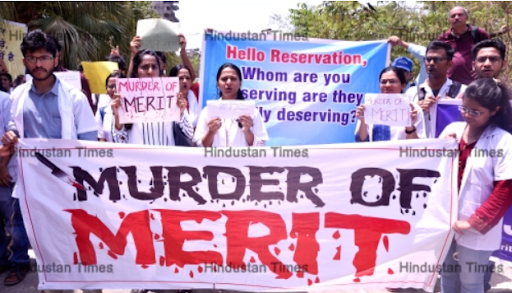The brahmins are champions of themselves, always. Here is an excerpt from the Miller report 1919, when Mysore for the first time in brahmin history questioned brahmin supremacy in the services and sought to bring in the backward classes into jobs.
Savari would like to remind EWS beneficiaries of their ancestors who have waged articulate battles to ensure their supremacy. Searching for background information about C. Srikantesvara Aiyar did not yield a lot, even within the extensively curated Iyer, Iyengar family trees on the internet – it was hard to find an image of this gentleman. The EWS worthy descendants should do a better job of honoring their merit-mongering grandparents.
The following passage is a part of the dissent notes from prominent brahmins being presented to the Miller committee. Please note the unchanging arguments made in 1919 and the present day anti-reservation rhetoric.
~~~
Note of Qualification by Rajasabhabhushana, Dewan Bahadur
C. Srikantesvara Aiyar
“1. My own views being in entire accord with the principles enunciated in Government Proceedings No. E. A. G. 308, dated 23rd August 1918, the aspirations of the backward communities for a larger share in Government appointments of all grades and for further advancement in education have my warmest and most active sympathies. It is therefore with extreme regret that I have to qualify my assent to the Report, as it has eventually emerged. I have to do so, not because any of the important conclusions in it lack my hearty approval but because I cannot subscribe to many of the arguments by which it seeks to support its recommendations. I shall, therefore confine myself to stating the points in regard to which I regret to have to differ with the views of some of my colleagues.
2. Although I am fully conscious of the grave drawbacks of the system of recruitment for public service by means of competitive examinations, I am not for its total abolition in that it is the only effective safeguard against official jobbery. In a form modified to ensure more satisfactory, its continuance is, to my mind, indispensable.
3. Earmarking a certain number of appointments for members of the backward communities and filling them up by promotions from lower grades superseding better men for no fault except that of not belonging to the class of community for which the vacancy is earmarked, is not only incorrect in principle but also unworkable in practice without detriment to the purity and efficiency of public service as a whole. Further an undue lowering of educational qualifications as a means of securing a larger proportion of the backward classes for higher appointments is a retrograde step and is inconsistent with the objects for which we have established a University. One of the most powerful incentives to higher education will have thus been taken away.
4. The proposal of importing men merely for the purpose of increasing the representation of the backward communities is contrary to the spirit of the Government Order constituting our Committee. We have only to suggest steps for encouraging the members of such communities “in the State,” to seek employment under Government in larger numbers. And it is difficult to understand how the bestowal of appointments on outsiders could be and encouragement to local citizens,
5. Shanbhogs do not come under the category of regular Government servants and any reference to them in this Report is irrelevant. Their appointment is governed by principles totally different from those obtaining in the case of the rest.
6. Social legislation is likewise a matter altogether outside the scope of this Committee’s work.
7. Lastly, the recommendations as a whole tend to perpetuate the very evil that this order of Government is seeking to remove. It is the ‘Preponderance’ of a community in public service, with its consequences, that is sought to be checked. By lumping together all the backward classes, we but actively help the pushful ones among them to tread on the toes of the others. That this is not an imaginary piece of criticism is amply borne out by the facts and figures furnished by the reports of the Scholarship Committees of the backward classes, which we have but boldly to face. They bear incontestable testimony to the universal tendency to overlook the claims of the unrepresented or more backward communities. I am, therefore, strongly opposed to the lumping together of all such classes. Each of them should have its due share of attention paid to it separately, and its interests properly safeguarded.
8. Barring these exceptions, I generally agree to the recommendations in the report. Only, I should like to emphasize that whatever may be done for the advancement, of any community, the utmost care should be taken to see that the motive to better them is not impaired, the incentive to make themselves competent is not taken away.
MYSORE.
30th July 1919. C. SRIKANTESVARA AIYAR.“
~~~
Image courtesy: Internet
